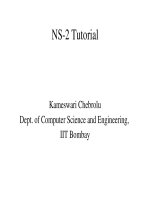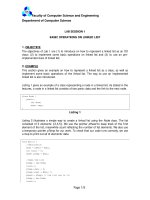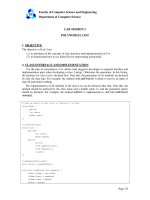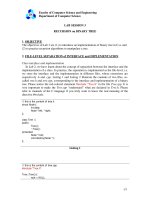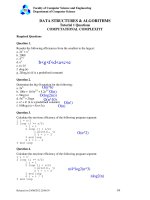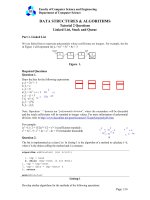ENCYCLOPEDIA OF ENVIRONMENTAL SCIENCE AND ENGINEERING - ENVIRONMENTAL EDUCATION doc
Bạn đang xem bản rút gọn của tài liệu. Xem và tải ngay bản đầy đủ của tài liệu tại đây (113.28 KB, 1 trang )
333
ENVIRONMENTAL EDUCATION
The broad field of environmental science and engineering
is truly interdisciplinary in nature and any discussion of
environmental education must address the many facets and
levels of this topic. Is the effort to increase understanding
and respect for one’s surroundings? This might well begin
in the primary school and extend to the post secondary level.
Is the intent to produce a practicing professional in one or
more of the fields which comprise environmental science
and engineering? This involves undergraduate and, possibly,
graduate work. The discussion presented here will deal with
practicioners. Practicioners will mean scientists, engineers,
managers, planners, policy makers, environmental lawyers,
etc. ‘Etc.’ is used because almost every human action will
affect the environment and it is not possible to restrict the
disciplines. The fundamental breakdown of environmental
effort might be public health, conservation and resource
management but even this classification is too simplistic.
The education must be quite broad. It has been said that
a technician knows everything about the job except its place
in the universe. One cannot be certain that the first position
after graduation will last until retirement. A broad back-
ground gives greater flexibility. Although a topic may be
‘hot’ (newsworthy) at the moment, one may be certain that
equally serious and sensational problems will arise during
the working life of the student. While concentration can be
in one or more of many areas, an environmental scientist
or engineer must have more than superficial knowledge
of physics, chemistry, biology and microbiology. (Odum
defines ecology as ‘environmental biology’). Meteorology,
oceanography, geology, geography and hydraulics will be
important as will be fundamentals of non-ideological eco-
nomics. Mathematics should be carried to a fairly high
level, particularly statistics. Knowledge of local, national
and international statutes and regulations will be applied
constantly. An awareness of politics will be very important.
Public health practice and the fundamentals of conserva-
tion should be studied. Computer literacy will be necessary.
It is very important that written and oral communications
skills be developed. The world is becoming ever smaller
and competence in one or more foreign languages will be
valuable. In addition to the scientific and cultural subjects
just mentioned, an engineering student will study the spe-
cialized parts of that particular field of applied science. One
is, in essence, becoming a well-rounded person in a broad
discipline. It will be concluded that there is simply too much
material to compress into a four-year course of study. This is
correct and graduate study will be necessary in the majority
of cases.
The preceding brief discussion is meant as an introduc-
tion to the reader of the many disciplines which might well
be involved in education leading to careers in environmental
science or environmental engineering. One final observation
should be offered. When entering upon one’s post secondary
education there will be pressure pushing the student toward
currently fashionable fields. Such a course should be resisted.
One can expect to work on the order of forty years after the
terminal degree and it is wise to follow a field in which one
has developed an interest and can expect to be satisfied.
REFERENCES
Nicholas Murray Butler, Introduction to “ Engineers and Engineering in the
Renaissance” . W. B. Parsons. Williams and Wilkins, Baltimore, 1939.
Eugene B. Golub, Environmental Education. Encylopedia of Environmental
Science and Engineering. Second Edition. Gordon and Breach Science
Publishers, New York, 1983.
Eugene B. Golub, Environmental Education. Encyclopedia of Environmen-
tal Science and Engineering. Third Edition. Gordon and Breach Science
Publishers, New York, 1992.
P. H. Jones, Environmental Education. Encyclopedia of Environmental
Science and Engineering. First Edition. Gordon and Breach Science
Publishers, New York, 1976.
J. R. Pfafflin, P. Baham and F. S. Gill, Dictionary of Environmental Science
and Engineering. Gordon and Breach Publishers, Reading, 1996.
Andrew Porteous, Dictionary of Environmental Science and Technology.
Revised Edition. John Wiley and Sons Ltd., Chichester, 1992.
Abel Wolman, Water, Health, and Society. Selected Papers by Abel Wolman.
Gilbert F. White, Editor. Indiana University Press, Bloomington, 1969.
EUGENE B. GOLUB
New Jersey Institute of Technology
© 2006 by Taylor & Francis Group, LLC


